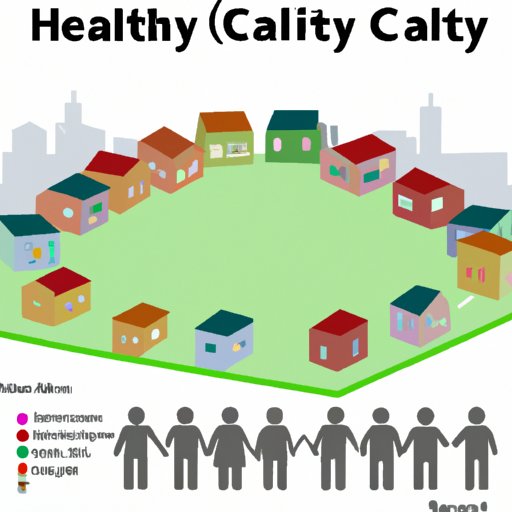Introduction
Community health is an important component of public health, focused on providing equitable access to quality health services and improving the overall health of a population. Community health initiatives strive to address the underlying causes of illness and disease, including poverty, income inequality, education, job opportunities, and discrimination. This article will explore the benefits, challenges, and impact of community health initiatives on global public health.

Exploring the Benefits of Community Health Programs
Community health programs are designed to promote health and prevent illness and disease in communities. These initiatives provide access to quality health care, increase prevention and awareness, and enhance public safety. By understanding the importance of community health, we can better advocate for resources and funding to support these programs.
Improving Access to Quality Care
Access to quality health care is essential for improving community health. According to a study published in the American Journal of Public Health, “access to quality primary care has been associated with improved health outcomes, reduction in hospitalizations, and reduced health care costs.” Community health initiatives strive to improve access to quality health care by increasing the availability of medical facilities and providers, as well as providing financial assistance for those who cannot afford health care.
Increasing Prevention and Awareness
Prevention and awareness play a key role in promoting community health. Through education and outreach, community health initiatives strive to raise awareness about health issues, such as obesity, smoking, and mental health, and provide resources and support to help individuals make healthier lifestyle choices. Additionally, many community health programs focus on providing vaccinations and screenings to reduce the spread of infectious diseases.
Enhancing Public Safety
Public safety is another key factor in improving community health. Community health initiatives work to ensure that individuals have access to safe and healthy environments, free from violence and other threats. These efforts often involve working with local law enforcement and government agencies to promote public safety and reduce crime and violence in a community.

Investigating Challenges Faced by Community Health Professionals
Despite the numerous benefits of community health initiatives, there are still many challenges facing community health professionals. These include limited resources, lack of funding, and stigma and social barriers.
Limited Resources
Community health initiatives often face limited resources, which can limit their effectiveness and reach. For example, many communities lack adequate health care facilities and providers, making it difficult to provide quality care. Additionally, many community health programs rely heavily on volunteers and donations, which can be difficult to sustain over time.
Lack of Funding
Funding is another major challenge facing community health professionals. Many organizations struggle to secure adequate funding to support their initiatives, making it difficult to expand and improve upon existing programs. Additionally, cuts to public health budgets can further limit the resources available for community health initiatives.
Stigma and Social Barriers
Stigma and social barriers can also impede the success of community health initiatives. Many individuals may be reluctant to seek medical care or participate in community health programs due to cultural or religious beliefs, fear of judgment, or lack of trust in the health care system. It is important for community health professionals to be aware of and address these issues in order to promote health and wellness in the community.
Understanding the Role of Community Health in Global Public Health
Community health initiatives play an important role in global public health. By promoting equitable health outcomes and reducing health inequalities, these initiatives can help improve the overall health of a population. Additionally, community health programs can increase health literacy, empowering individuals to make informed decisions about their health and wellbeing.
Promoting Equitable Health Outcomes
Community health initiatives strive to promote equitable health outcomes by reducing disparities in access to quality care. These efforts often involve providing resources and support to underserved populations, such as the elderly, individuals with disabilities, and low-income families. By addressing the needs of these populations, community health initiatives can help ensure that everyone has access to quality health care.
Reducing Health Inequalities
In addition to promoting equitable health outcomes, community health initiatives also strive to reduce health inequalities. According to a study published in the Journal of Public Health Policy, “community health initiatives can help to reduce health inequalities by targeting those most at risk and providing interventions to address their specific needs.” By focusing on preventing and treating illnesses and diseases in vulnerable populations, these initiatives can help to reduce health disparities.
Increasing Health Literacy
Health literacy is an important part of community health initiatives. These programs strive to educate individuals about health issues, such as nutrition, exercise, and mental health, and provide resources to help them make informed decisions about their health and wellbeing. By increasing health literacy, community health initiatives can empower individuals to take control of their health and lead healthier lives.

Analyzing the Impact of Community Health on Social Determinants of Health
Social determinants of health, such as poverty, income inequality, education, job opportunities, and discrimination, are key factors in determining an individual’s health and wellbeing. Community health initiatives strive to address these social determinants in order to improve the overall health of a population.
Addressing Poverty and Income Inequality
Poverty and income inequality are two of the most significant social determinants of health. Community health initiatives strive to address these issues by providing financial assistance and resources to those in need. Additionally, many programs focus on creating job opportunities and providing educational and vocational training to help individuals escape poverty and achieve economic self-sufficiency.
Improving Education and Job Opportunities
Education and job opportunities are also important social determinants of health. Community health initiatives strive to improve access to quality education and create job opportunities for individuals in underserved communities. These initiatives often involve working with local businesses and government agencies to provide resources and support to those most in need.
Reducing Discrimination and Marginalization
Discrimination and marginalization are two other key social determinants of health. Community health initiatives strive to reduce discrimination and marginalization by raising awareness and providing resources to those affected. Additionally, these initiatives often involve advocacy and policy change to ensure that all individuals, regardless of race, gender, or socio-economic status, have access to quality health care.
Conclusion
Community health initiatives play an essential role in improving the overall health of a population. By providing access to quality health care, increasing prevention and awareness, and enhancing public safety, these initiatives strive to address the underlying causes of illness and disease. Additionally, community health initiatives focus on reducing health inequalities and addressing social determinants of health, such as poverty, income inequality, education, job opportunities, and discrimination. To ensure the continued success of these initiatives, it is important to advocate for greater resources and funding to support community health programs.
Summary of Key Points
This article explored the essential role of community health in public health. The benefits of community health initiatives were discussed, including improving access to quality care, increasing prevention and awareness, and enhancing public safety. Additionally, the challenges and impact of these programs on global public health were examined. Finally, recommendations for action were provided to ensure the continued success of community health initiatives.
Recommendations for Action
To ensure the continued success of community health initiatives, it is important to advocate for greater resources and funding. Additionally, it is essential to raise awareness about the benefits of these programs and address the challenges faced by community health professionals. Finally, it is important to recognize the essential role of community health in global public health and the need to reduce health inequalities and address social determinants of health.
(Note: Is this article not meeting your expectations? Do you have knowledge or insights to share? Unlock new opportunities and expand your reach by joining our authors team. Click Registration to join us and share your expertise with our readers.)
